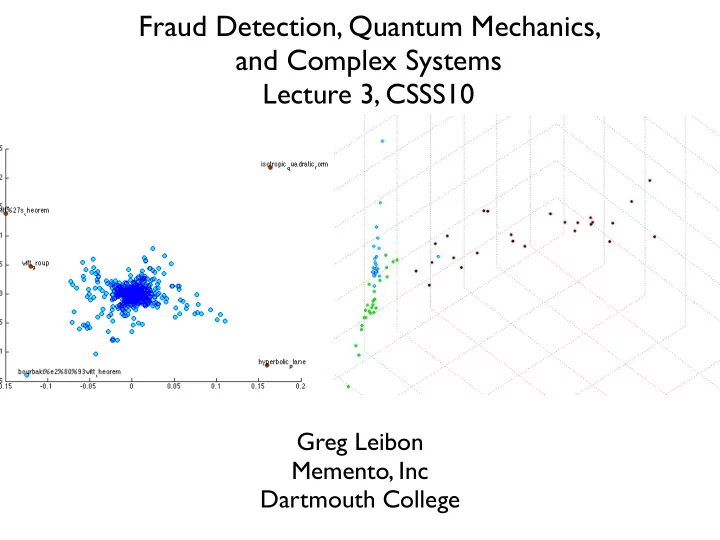

Fraud Detection, Quantum Mechanics, and Complex Systems Lecture 3, CSSS10 Greg Leibon Memento, Inc Dartmouth College
N=200; K=10; [states]=PlotTheState( N,K);
The solution (I think!) NP hard Recall:
How we really solve this?
Now we cluster in Euclidean space...
K-means • Simplest clustering algorithm is k-means • To run requires fixing K=#(Clusters) • Requires an Euclidean type embedding • We are attempting to minimizing a loss function: 2 K ∑ ∑ ( ) L = x i − µ k k = 1 x i ∈ C k
K-means algorithm: 1. Randomly choose points in each cluster and compute centroids. Example from: http://en.wikipedia.org/wiki/K-means_algorithm
2. Organize points by distance to the centroids. 3. Update centroids
4. Repeat...
...until stable.
A hard part is choosing K=#(Clusters) Elbowlogy: 90 80 2 K ∑ ∑ ( ) L = x i − µ k L elbow 70 k = 1 x i ∈ C k 60 50 40 30 0 5 10 15 20 25 30 Number of Clusters Though is practice this rarely works in a complex multi-scalar system system
How?
where Why is this good, well it takes two to Tango! Spectral Theorem: If <,> is a Hermitian inner product and <Av,w>=<v,Aw>, then there is an orthonormal basis of A eigenvectors.
The Context Operator Information in Eigenfunctions Not Local λ 2 λ 30
http://www.youtube.com/watch?v=Uu6Ox5LrhJg&feature=response_watch
The Green-Kelvin Identity f Δ fd r 2 d r ∫ f , g = f ( x ) g ( x ) dVol ( x ) ∫ ∫ f , Δ f = x = ∇ f x M ∑ f i w i g i f , g = i = 1 j f i − f j j − P 2 j ) f j ∑ ∑ ( ) f j w i ( I i w i P f , Δ f = i i 2 i , j i , j
First three (non-trivial) The perfect Vagabond eigenfunctions functions
Space of mathematics list_of_geometric_topology_topic list_of_statistics_articles Green’s list_of_computability_complexity_topic Embedding vagabond embedding
rare point are de-emphasized
tries to become a cluster
Kakawa’s Salted Carmel time! (well, except Kakawa wasn’t open) What is the difference? figure 1 figure 2 close all Show=0; N=100; figure(1); [states WR TR]=SnakeRev(N,5,'Vg',Show,1,1,1,1,1,0,0,0,0,0,0,0); figure(2); [states WR TR]=SnakeRev(N,5,'Vg',Show,0,1,1,1,1,0,0,0,0,0,0,0);
The answer: figure 1 figure 2 close all Show=1; N=100; figure(1); [states WR TR]=SnakeRev(N,5,'Vg',Show,1,1,1,1,1,0,0,0,0,0,0,0); figure(2); [states WR TR]=SnakeRev(N,5,'Vg',Show,0,1,1,1,1,0,0,0,0,0,0,0);
Reversibility Theorem: Reversible if and only if there is symmetric conductance matrix such that
starting from equilibrium, if I reflected this you’d never know N=200; K=10; [states]=PlotTheState( N,K); Theorem: For a reversible chain, the vagabond embedding is the PCA of the green’s embedding weighted by the equilibrium vector
Theorem: For any chain P , there is a unique (up to a multiplicative constant) conductance W and divergence free, compatible flow F such that
Clearly the vagabond is missing half the geometry.
function chain Shall we dance?
verses
How to find them...
The scenario operator: Text Scenario operators have highly localized eigenfunctions
The scenario operator:
Eigenfunction in the Space of Mathematics isotropic_quadradic_form witt_theorem witt_group hyperbolic_plane Scenario operators have highly localized eigenfunctions
Reality.... We need something like the vagabond clustering for cycles The Co-conformal Cycle Hunt
Co-conformal Magnetization magn
Not all cycles are created equally.... Wy do need this fellow to find a naughty cycle?
Claim: The operator allows us to detect scenarios which are anomalous relative to the context (all cycles weight 10) Which cycles are in context and which are not?
Claim: The operator allows us to detect scenarios which are anomalous relative to the context
http://www.youtube.com/watch?v=KT7xJ0tjB4A
Mathematics of Quantum Mechanics Hilbert Space States Measurements Expectation { Deviation
Why does this work?
Recommend
More recommend